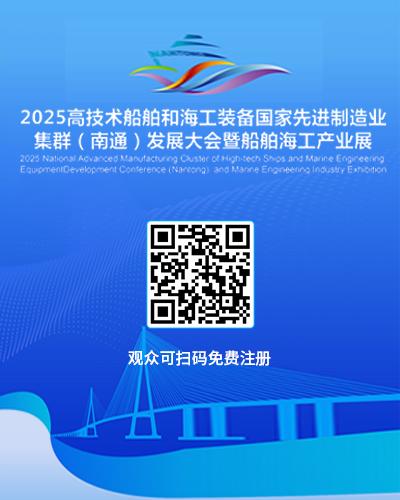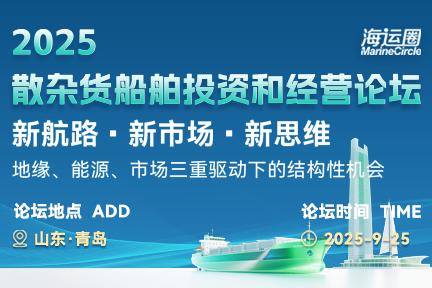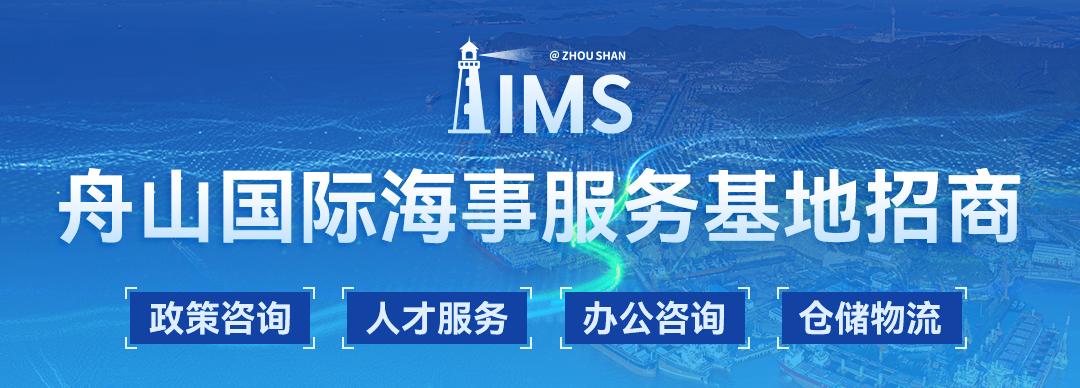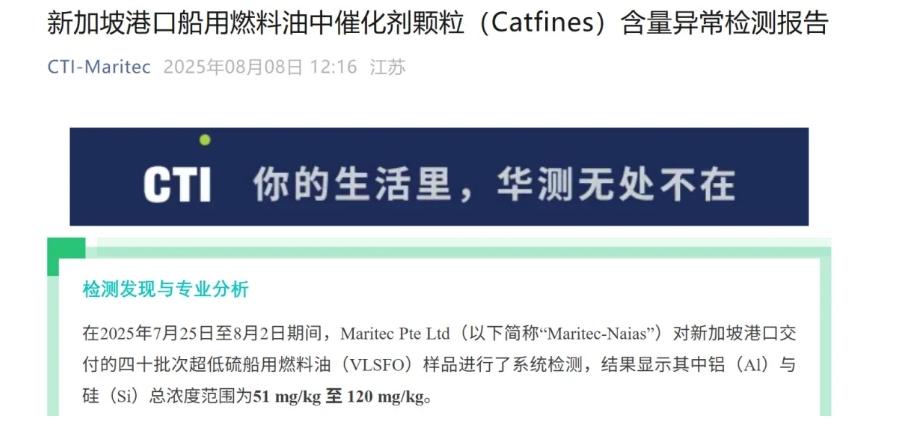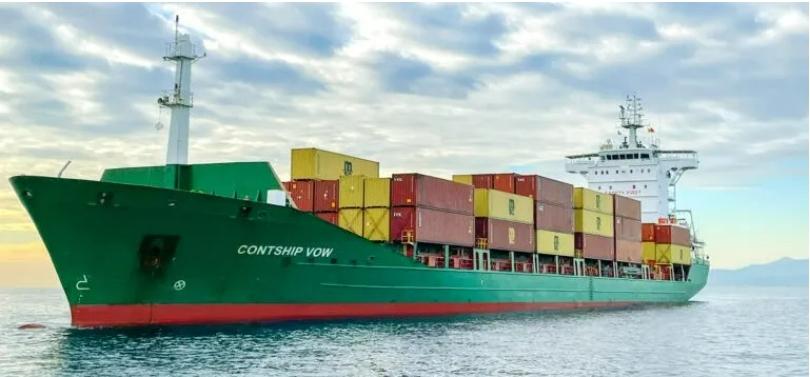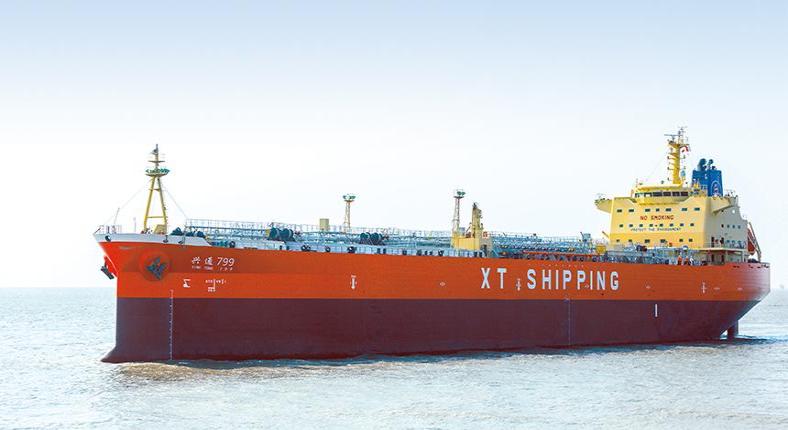【关键词】换单、Switch B/L、风险
这几天在处理一个争议事项,被一家Broker告之,合同没有用,现实中船东就这么做的;按合同来,这不是解决问题的办法。于是心情大受打击,不按合同来,那还谈合同做什么?二船东在正本提单已经到的情况下,竟然非法指示代理扣货,还感觉有理有据。我想说,这家牛气冲天的土豪,你不拿合同当回事,法律也自然不拿你当回事。
为了避免受此影响,回去翻了翻10年前的资料,再来感受一下当时巴拿马日租金水平上10万,好望角上20万,BDI指数上万点的快感。
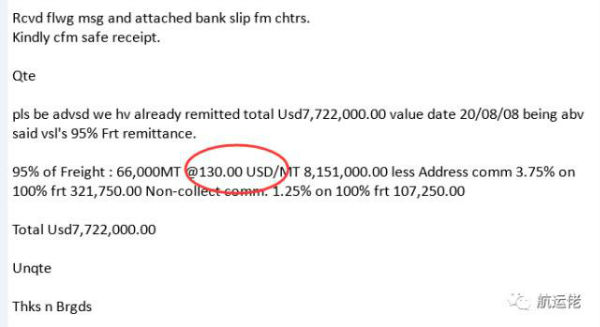
电邮中显示的是运价130USD/MT,当时一条巴拿马船南美装粮回国的运价,现在的水平连零头都不足。当时不管是船东还是租家还是贸易商,都皆大欢喜,大家都躺着数钱。货也值钱,这些粮食贸易商在货物买卖过程中,于是就不那么希望买家知道实际的发货人,把那些不知名的发货人隐瞒了,然后统一用一个知名的发货人,以便货物买卖能顺利进行。在这种情况下,就需要签发新的提单,把发货人的名字给改了,那么这种行为就是转换提单。
现在以某H轮为例,当时(08年,快十年了)该轮到阿根廷的San Lorenzo及Bahia Blanca装粮,最终按租家的买卖合同装了上限,66,000吨。当然船方水尺算的货量和岸方提供的数据一如既往地不一致,船长也按要求在大副收据上加了批注。
离港后,租家要求改发货人的名字及通知人的地址,面对租家此要求,也不能无理拒绝,于是选择在新加坡换单,委托了船东自己的代理来处理此事,发了如下电邮给代理:
Dear Sir,
Good days!
We have a vessel, named MV XXX, loaded 66,000.00 MT SOYBEANS at San Lorenzo + Bahia Blanca,Argentina.
We intend to appoint your good firm as our agents to issue original Bill of Lading in Singapore against charterers’ LOI in owners’ P&I club wordings with charterers’option to change the name of the shipper/consignee/notify party, but quantity to remain the same as per mate's receipt.
The following are very important:
1. We have forward your full style to Charterers and Charterers will contact you with bs/l draft duly.
2. Bs/l draft must be strictly in conformity with mate's receipt. Please kindly find attached mate's receipt.
3. Before sign/release original bs/l, you must forward us original copy and get our writing confirmation.
4. Please kindly inform your charge for attending this matter.
该电邮包含了几个方面的信息,一是只改发货人及通知人地址,货量保持不变;二是其余的必须与大副收据一致;三是在签发释放新的提单之前,必须得到船东的书面确认。任何电邮,需要代理去做什么,一定要清晰明确,不可模糊,要不然很可能导致局面失控。
最终签发了如下看起来很漂亮的提单,发货人是一家知名的发货人,提单为运费预付提单,货量前也加上了SAID TO BE,双方都感到满意。 
庆幸的是,H轮在国内卸完货也都一切正常,没有出现任何意外。但是如果真的出现了争议,租家是否可能凭着这个转换的提单来找原船东索赔呢?还是租家并没有权利,只能从另外的角度出发呢?如果租家在没有船东授权的情况下,私自签发了转换提单,收了运费又不付给船东该如何应对呢?那么接下来,先来看看The“Dolores”轮案。
一、基本案情
在1993年2月,SamsungCorp(以下简称“原告”)与Devon Industries Sdn Bhd(以下简称“被告”) 以FOB的方式签订了一份买卖合同,原告卖给被告7,500吨散装大豆油,装港为阿根廷的Rosario,价格为398美元每吨。7,500吨分三个月执行, 5月,6月及7月每月2,500吨。付款要求是“by CAD within 48 hours toSamsung Singapore Pte Ltd in Singapore”。
第一载货,原告的供应商于5月13日装到被告租来的Dolores轮(以下简称“该轮”)1,000吨,5月15日装了1,500吨。这些大豆油并没有独立分开,与别的供应商的货混在了一起。两套提单No.006与No.003分别于5月13日及5月15日签发,并在5月底6月初释放。显然提单释放被延误了差不多两个星期。每套提单都包含了以下商业条款:这份提单的货与其他更大的货载混合一起装在同一个舱。
Quantity covered by this bill of lading is part of a larger shipment loaded commingledin same tank.
Samsung Singapore在6月10日收到带有背书的提单。在6月15日,Samsung Singapore将此提单及其它货物单证交给了被告,要求被告支付995,000美元的货款,但是被告并没有安排。
在FOB条款下,被高租进了该轮去执行此航次,连同被告其它的货,总共10,500吨,到Chittagong, Bangladesh卸。其中5,500吨在Rosario装,剩下的在巴西的Rio Grande装。被告与船东之间的合同约定,在完货后5个工作日内支付运费,收到运费后才放提单给发货人。被告在5月28日将运费付到了船舶在新加坡的代理,毫无疑问被告并没有履行合同义务,及时安排支付运费。因此,被告由于自己的行为延误了放单给发货人,也直接导致延误了原告找被告收取运费。
在付运费及货款之前,被告在没有收到已背书提单的情况下,将10,500吨货物以CIF条款,卖给了在Chittagong,孟加拉的买家。
在原告不知情的情况下,被告在新加坡委托了他们的代理,对于该批货物签发了第二套运费预付提单(也就是装换提单,Switch B/L)。这意味着签发了第二套提单,该转换提单反映了被告向孟加拉不同买家出售的数量。提单日期为5月24日或5月25日,发货人改为被告自己。被告在收到全套转换提单,早于发货人收到原来签发的真正的提单。
被告的新加坡代理在被告的指示下,把该票货拆分成了18套提单,其中12套在5月24日签发,5套在5月25日,1套在6月10日,总共包括了9,500吨货。上述所有的18套转换提单连同其他所要求的装船单据,由被告与被告各银行在5月26日至6月16日之间进行流通/贴现。
被告承认他们没有付款给原告及其它发货人,把不属于他们的货卖给了在孟加拉的买家,从买家或他们的银行收到了货款。
在这种情况下,被告因并未向法院透露其陷入严重的经济困境,未能支付原告的费用原因。在这些事件发生后不久,被告就被置于司法管理之下。因此,现在需要做的是为了取回被告拥有的真实提单。
二、新加坡高等法院判决
被告说他们听取了法律意见,根据此意见,他们不需要退回真正的提单即使是他们并没有付款给原告。被告试图使他们不退还真正的提单合理化是基于两个方面的原因。首先,被告说,原告放弃了凭货物文件主要是真正的提单支付现金的权利,因此货物已转移给被告。被告只有在获得了这类所有权后才被要求付款,但后来被告他们无法付款,因为情况使他们不得不接受司法管理。其次,被告主张原告的2,500吨油与其它发货人的油一同装到该轮舱里,混在一起最终卸在孟加拉海关当局的油舱里,原告的货物因此不再能够辨认是原告的。因此货物已经转换及恰当地归属了转换提单。GP Selvam法官并不接受被告此主张。
GP Selvam法官认为,在FOB条款下,财产如风险一样在货物装船后转移到买家身上,但是这并不是神圣不可侵犯的规则。财产转移的问题,不仅要参照合同中的FOB条款中的字眼,而且要根据买卖合同的商业实际情况以确定合同当事人的真实意图。法官引援Roskill勋爵在Albacruz (Cargo Owners)v Albazero (Owners)[1977]案中所说的,认为是一个有价值的参考:
It is a trite observation that what is sometimes called a true fob or a true cif contract is a comparative commercial rarity. Contracts vary infinitely according to the wishes of the parties to them. Though a contract may include the letters fob or cif amongst its terms, it may well be that other terms of the contract clearly show that the use of those letters is intended to do no more than show where the incidence of liability for freight or insurance will lieas between buyer and seller but is not to denote the mode of performance of the seller’s obligations to the buyer or of the buyer’s obligations to the seller. In other cases, though the letters cif are used, other terms of the contract may show that the property is intended to pass on shipment and not upon tender of and payment against the documents so tendered or though the letters fob areused, other terms may show that the property was not intended to pass on shipment but upon tender and payment, the seller by the form in which he took the bill of lading intending to reserve his right of disposal of the property until he was paid against the shipping documents.
这是一个老生常谈,有时被称为一个真正的FOB或真正的CIF合同是一个商业比较罕见,合同根据双方当事人的意愿经常发生变化。
关于FOB的权威观点可见在Mitsui & Co Ltd v Flota MercanteGrancolombiana SA[1988]案中说的,FOB所表达是确定货物应如何交付,卖方应承担多少费用,损失或损坏的风险什么时候传递给买方,它不一定需要决定什么时候财产发生转移。
… The expression ‘fob’ determines how the goods shall bedelivered, how much of the expense shall be borne by the sellers, and when therisk of loss or damage shall pass to the buyers. It does not necessarily decidewhen the property is to pass.
在《Sale of Goods》1995年第9版中提到如下:在货物装船后,并借助提单把货物交付给卖方或其代理人,卖方将有初步的处分权;有个条件是必须付款给卖方财产才会转交给买方。
Where goods are shipped, and by the bill of lading the goods are deliverable to the order of the seller or his agent, the seller is prima facie to be taken to reserve the right of disposal.
This reservation of the right of disposal makes the appropriation conditional under s 19(1) so that property does not pass until the condition is satisfied.It is clear that today there is nothing contrary to the nature of the fob contract in the seller doing this, and indeed, as already said, it is nowadays very common. The result is that the shipment is treated under s 19 as only amounting to a conditional appropriation, the condition being that the seller must be paid before property passes.
被告引援Panda OHG v Circle Products Ltd [1970]案中提到的,一个FOB合同,其本质是,免费装船(即卖家的费用),交付给买方或其代理。在货物合同下,卖方在此后不能理所当然地退出或处置货物。在他们的财产权转移给买方前,他们将负责运费及承担货物的风险。
The essence of an fob contract is that the goods are to be shipped free on board a ship (ie at the seller’s expense) and consigned to the buyer or his agent. On shipment the goods are appropriated to the contract and the seller cannot thereafter rightfully withdraw or otherwise dispose of the goods. The property in them passes to the buyer, who is responsible for the freight and the goods are at the buyer’s risk.
法官认为一个真正的FOB合同的一个重要因素就是,货物应交付给买方或其代理人,这观点在LadingAct 1855 及the English Carriage of Goods By Sea Act 1992 中也再次得到确认。
An essential element of a true fob contract is that the goods must be consigned tothe buyer or his agent. This position was recognised both by the Bills of Lading Act 1855 and the English Carriage of Goods By Sea Act 1992 (SingaporeBill of Lading Act (Cap 384, 1994 Ed).
法官认为在Panda案中,作为本质的问题,合同被认为是基于真正的FOB条款。但是在本案中,租约的真实意图,在传统上来说并不是一个真正的FOB合同。主要原因是货物没有交给被告,而是按指示办理的。合同非常明确地要求原告提供全套清洁装船的提单,按指示及空白标注有运费向收货人收取。鉴于此,财产将转移及交付给被告如果被告安排付款作为交换;FOB的合同的目的是为了确定原告对于约定的价值所承担的责任义务,它和将财产转移给被告没有关系。被告因此只能,当他们获得真正的提单才能将货物占为己有。
关于缩写CAD的含义,在《Sale of Goods》一书中,Benjamin说到,如果合同明文规定,货物交付,或能控制货物的单证,需基于货款支付或价值担保,买家可被认为保留了处置权及货物所有权,直到已经付款或提供担保。
If the terms of the contract or appropriation expressly provide that delivery of the goods, or of a document giving control of the goods, is to be made or given against payment of the price or the provision of security for the price, the seller may be held to have reserved the right of disposal and retained ownership of the goods until payment has been made or a security provided.But such an inference is not inevitable, and it is a question of fact in each case whether the passing of property is conditional upon such an event.
CAD全称为“cash against documents”,法官认为这并不意味着硬币和纸币的实际现金。价值995,000美元,在新加坡安排付款,当事人不可能有这种意图,手中现金交付。它的意思是付款交单,“现金”一词是用来说明它不是一个信用销售。
而“against”一词的意思,法官认为其并不意味着付款和交付单证需同时进行,这在实际上也几乎是不可能的,这词的意思是“In return for ”,作为回报。它真正的意思是付款是一个交付单证的条件,直到被告已经安排了付款,被告才有权利将这些单证视为自己的财产。
法官认为,当事人双方订立合同的意图是,根据本案的事实,当事人并不打算被告在安排付款作为交换之前,被告有权获得货物或单证的所有权。由于被告未能付款,无法按照合同规定付款,法官最后命令被告他们退回单证,特别是将正本第一套提单还给原告。
My construction of the contract between the parties is that on the facts of this case the parties did not intend that the defendants would acquire title to the goods or the documents before they made payment in return for the documents. As the defendants failed to make payment and were not in a position to make payment as provided in the contract I ordered them to return the documents and in particular the original first set of bills of lading to the plaintiffs.
而对于被告关于货物已经混了,无法区分是被告的货物,因此被告不再拥有货物所有权。法官认为,如果被告这么认为的话,那么将对被告更为不利。在Indian Oil Corporation Ltd v Greenstone Shipping Co SA [1988]案中,法院判,如果一方错误地将别的货物与自己的货物混在一起,变成同一性质及质量,为了实际目的而无法分开,无辜方有权获得等同于在混之前属于他的那一部分货物;如果对数量及质量仍然有怀疑,应该以对无辜方有利的来处理。
It was held that where a party wrongfully mixed the goods of another with his own goods which were substantially of the same nature and quality, andthey could not be separated for practical purposes, the mixture was held incommon and the innocent party was entitled to receive from it a quantity equal to that of his goods which had gone into the mixture. If doubt remained as to either quantity or quality, the matter should be resolved in the innocent party’s favour.
这类转换提单的,在The “Altas”案中,也发生过。
在1991年12月10日,Sewon Shippping Co.(以下简称“二船东”“将Altas轮(以下简称“该轮”)程租给Noble Chartering A.G.of Swizerland(以下简称“租家”),去执行一个从俄罗斯远东的Nakhodka装热轧钢坯到台湾卸的航次任务。
在1991年12月底到1992年1月4装完,该轮的船长明确授权 Tesei Co.,Ltd (二船东的代理,以下简称“代理”)以代表船长签发提单。提单上分开显示575捆重5,005.70吨;572捆重5,008.40吨及233捆重2,024.10吨,共1380捆总重12,038.20吨。
该份提单显示发货人一栏为“Russian exporters”,通知地址栏为“Nobel Resources Ltd”(租家的关联公司)。但租家不想让收货人知道实际的发货人是谁,因此要求换单。租家在香港委托代理进行了换单,把发货人改为了“Nobel Resources Ltd”,即第一套提单的通知人,而转换提单上的通知人则变为了在台湾实际的收货人。
合同第35条规定如下:
If require by Charterers, Owners agree to issue 2nd set of freight prepaid Bill(s)of Lading in Hong Kong marked different Shippers/Receivers, notify party than those of the 1st set of Bills of Lading and marked cargo descriptionas steel billets, after receiving 100% of freight and against Charterers’Letter of Indemnity only. Charterers will return 1st set of originalBills of Lading to Owners once same in their hand.
In the absence of original Bills of Lading at discharge port Receivers to submit a Letter of Indemnity in accordance with Owners’ P&I Club’s form. Charterers should advise full details of 2nd set Bills of Lading uponcompletion of loading.
在台湾卸货的时候,按岸方理货人员的数据是1,348捆重10,756.97吨,也就是说短少了32捆或1,281吨。
租家认为按海牙规则,提单上的数据已经是货物已实际装船的初步证据。
After receiving the goods into his charge the carrier or the master or agent of the carrier shall, on demand of the shipper, issue to the shipper a bill of lading showing
among other things:
承运人或船长或承运人的代理人在收受货物归其照管后,经托运人的请求,应向托运人签发提单,其上载明下列各项:
Such a bill of lading shall be prima facie evidence of the receipt by the carrier of
the goods as therein described in accordance with paragraph 3(a), (b) and (c).
依照第3款(a)、(b)、(c)项所载内容的这样一张提单,应作为
承运人收到该提单中所载货物的初步证据。
但Longmore法官判船东无需负责,因为提单上已经加了批注“All particulars(weight,measure, marks, numbers, quantity, contents, value…) thereof as stated by Merchant but unknown to the Carrier”。在该案中,法官再次重申,加了这类批注不构成任何货物已经装船的证据。
It was also established that a bill of lading which acknowledged a quantity of goods “said to be ” of a certain weight withthe additional words “weight unknown” did not constitute evidence of any particular quantity of goods shipped.
I therefore conclude that neither the Russian bills nor the switch bills constitute prima facie evidence of the number ofbundles or quantity shipped.
关于短货部分的判决,不再详细叙述;这类批注的问题可以参之前文章。
关于货物的诉权,Longmore法官认为,很难想象如何能说二船东需对转换提单的条款负责,转换提单仅仅是依据程租合同下特别条款租家自己签发的;也不接受租家在香港委托的代理默认地有船东签发提单的授权,船长也没有这样的授权。
I cannot see how it can be said that the defendant shipowners are bound by the terms of the Switch bills, They were issued by the charterers pursuant to a specific clause in the voyage charter.
I cannot accept that other agents of Sewon in Hong Kong can be impliedly or ostensibly authorized by Owners to issue a second set of bills of lading.
A master has no such authority.
也就是说船长只有签发一套提单的权力,不能再签发第二套;该第二套提单仅仅是合同条款赋予租家签发转换提单的权利,但是这转换提单对于船东没有约束力。
总结评论:
如在The “Doolores”案中,被告在原告不知情的情况下,私自委托代理重新签发第二套转换提单,而且还想以货物已经混在一起想据为己有,这么天真的想法,法院理所当然地判被告得赔偿原告损失,并退回第一套的正本提单。
在现实中也一样,船东切不可发一份自己的租金发票或滞期费计算发票,然后要求租家必须按此发票来付款,要不然就采取非法扣货的手段来逼租家确认并付款。正确的逻辑是,你得先去看,自己的发票对不对;其次得去看租金或者滞期费到期了没有;再次再去看合同里有没有赋予船东扣货的权利。如果自己发票不对,租金或运费也未到期,合同条款也未赋予船东这个权利,然后在收货人正本提单已到的情况下,还选择扣货,这不明摆着在租约和提单合同下都违约了嘛。只能说国内的收货人太过善良,有正本提单在手的情况下,如果不放货,可以去扣船,不管官司打到哪,非法扣货的那一方最终都得自己赔偿所有损失;非法扣货如果是二船东,原船东会依据LOI条款,找二船东索赔。
现在回到转换提单上来,如果想同意租家的转换提单的要求,那么为了避免出现不可控的局面,应该如The“Atlas”案一样,在租约中加入对应的条款。
If require by Charterers, Owners agree to issue 2nd set of freight prepaid Bill(s) of Lading in Hong Kong marked different Shippers/Receivers, notify party than those of the 1stset of Bills of Lading and marked cargo description as steel billets, after receiving 100% of freight and against Charterers’ Letter of Indemnity only. Charterers will return 1st set of original Bills of Lading to Ownersonce same in their hand.
In the absence of original Bills of Lading at discharge port Receivers to submit a Letter of Indemnity in accordance with Owners’ P&I Club’s form. Charterers should advise full details of 2ndset Bills of Lading upon completion of loading.
这条款里已经说明了,签发有几个条件,一是在收到100%的运费;二是收到租家的保函;三是租家得退回第一套正本提单。同时在完货的时候租家应该告诉第二套提单全部详细的信息。这点也就是要求,在同意签发之前,必须先提供转货提单的草本,船东得仔细核对,看看是否有不合理或错误的地方。
作为二船东也要谨记,船长的授权仅仅是针对第一套提单,船长也只能签发一套提单而没有权利再签发第二套提单。因此,如果没有再次取得船东授权的情况下,而私自去签发提单,那么这种行为因为未获得授权,而会使得转换提单对船东没有约束力。
而作为精明的船东,应先以各种借口先拒绝租家签发转换提单的要求,尽量避免在合同中并入转换提单的条款;因为一旦并入,就变成了租家的选择权,船东不同意的话就构成了违约。如果迫不得已,必须得同意租家签发转换提单,先把转换提单的条款并入租约,同时还必须注意并做好以下几点:
(1) 租家提供保函(再严格点要求提供一级银行担保)
(2) 确认收到全部的第一套正本提单
(3) 船东委托自己代理并授权代理签发(如果是二船东,必须得取得原船东授权)
(4) 仔细核对转换提单上的信息,除了发货人和收货人名称可以更改外,之外的任何信息,包括装货港、卸货港、货物描述、批注、数量等等必须与第一套正本提单完全一致。(如果不一致可能存在错误描述构成侵权欺诈)

 2017-08-02
2017-08-02 1980
1980 



